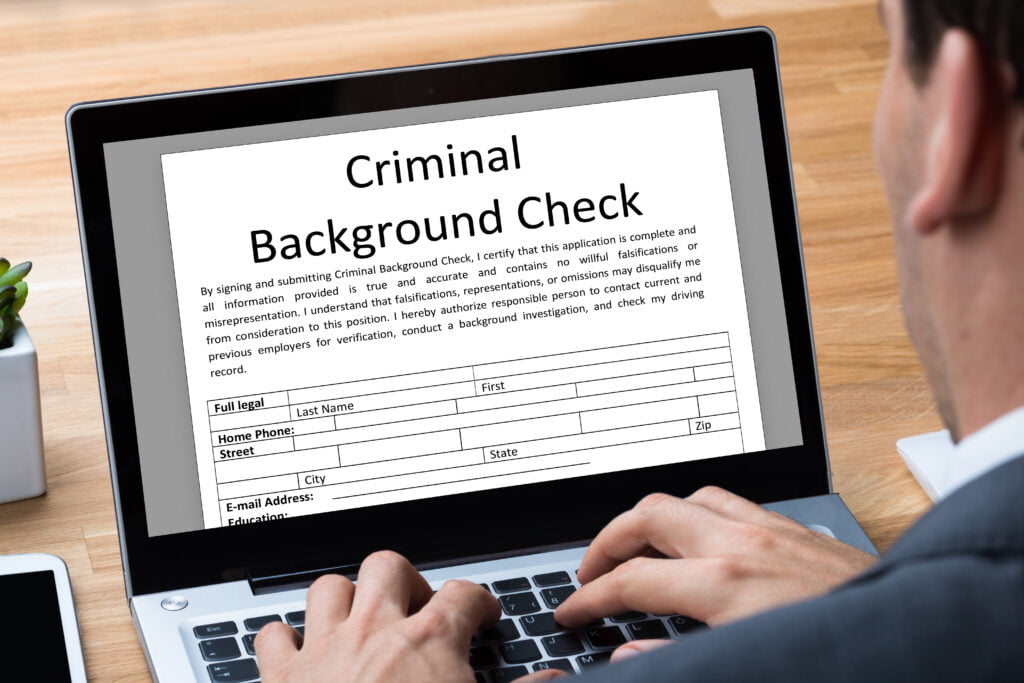When applying for a new job, it is common for employers to conduct a background check on potential employees. This process helps employers ensure that they are hiring qualified and trustworthy individuals. When you’re in the process of applying for jobs, comprehending what an employment background check entails are crucial. Below is a sample of what to expect in an Employment Background Check.
Here is a sample of what a typical employment background check may include.
Personal Information
The first part of an employment background verification, typically performed by employers or recruitment agencies, generally includes a broad range of personal details related to the candidate. This valuable data entails crucial details like your full name, the exact date of your birth, and the ever-important social security number that has become a vital identification factor within the United States. These specific pieces of personal information enable employers to verify the identity of candidates with precision and accuracy, ensuring a thorough screening process.
Employment History
One of the main purposes of an employment background check is to verify your employment history. This section will include a list of your previous employers, job titles, and dates of employment. It may also include information about your job responsibilities and reasons for leaving each position.
Education and Credentials
Employers also want to ensure that you have the necessary education and credentials for the job. This section will include information about your educational background, including the schools you attended, degrees earned, and any certifications or licenses you hold.
Criminal History

by Giovanni Randisi (https://unsplash.com/@phosleep)
A criminal background check is a crucial part of an employment background check. This section will include any criminal records found in your name, including arrests, convictions, and pending charges. It is important to note that not all criminal records will automatically disqualify you from a job, as employers must consider the nature of the offense and how it relates to the job.
A criminal record can typically be used for background checks indefinitely. However, the extent to which employers consider past criminal records can vary depending on the nature of the offense and the job requirements. Some employers may have specific policies regarding the time frame for considering criminal records, while others may take a more holistic approach and consider the relevance of the offense to the job. It’s important to note that certain laws and regulations may restrict the use of criminal records for employment purposes, such as the Fair Credit Reporting Act (FCRA) in the United States. It is advisable to consult local laws and regulations or seek legal advice for specific information regarding the use of criminal records in employment background checks.
Credit History
Some employers may also choose to conduct a credit check as part of the background check process. This section will include information about your credit history, including any outstanding debts, bankruptcies, or foreclosures. Employers may use this information to assess your financial responsibility and trustworthiness.
References
Employers may also contact your references to verify your employment history and character. This section will include the names and contact information of individuals who can speak to your work ethic and qualifications.
Motor Vehicle Reports
Employers run Motor Vehicle Reports (MVRs) as part of the background check process to assess an individual’s driving history and determine their suitability for certain job positions. Here are a few reasons why employers may choose to run MVRs:
- Safety: Employers want to ensure that their employees have a safe driving record, especially if the job involves driving company vehicles or transporting goods or passengers. By reviewing an individual’s MVR, employers can identify any patterns of unsafe driving behavior, such as frequent traffic violations or accidents, which may pose a risk to the company or its clients.
- Compliance: Certain industries, such as transportation, logistics, or delivery services, have specific legal requirements regarding driver qualifications. Employers may be legally obligated to conduct MVR checks to ensure that their employees meet these requirements and maintain a valid driver’s license.
- Insurance Purposes: Insurance companies often require employers to conduct MVR checks for employees who will be driving company vehicles. This helps insurance providers assess the risk associated with insuring the company and determine appropriate coverage and premiums.
- Liability: Employers may run MVRs to mitigate potential liability risks. If an employee with a history of reckless driving or DUI/DWI offenses causes an accident while on the job, the employer may be held partially responsible. By conducting MVR checks, employers can make informed decisions about hiring and reduce the likelihood of such incidents.
It’s important to note that the specific reasons for running MVRs may vary depending on the nature of the job and industry. Additionally, access to MVRs is typically restricted to authorized entities, such as employers or insurance companies, for legitimate purposes such as employment background checks or insurance underwriting.
Drug Testing

by National Cancer Institute (https://unsplash.com/@nci)
Depending on the nature of the job, employers may also require a drug test as part of the background check process. This section will include the results of any drug tests conducted and may also include information about any prescription medications you are taking.
5-Panel Drug Test
A 5-panel employment drug test is a type of drug test commonly used by employers during the background check process. It is called a “5-panel” test because it screens for the presence of five different types of drugs in a person’s system. These drugs typically include:
- Amphetamines: This category includes drugs like methamphetamine and prescription medications like Adderall.
- Cocaine: This includes both cocaine and crack cocaine.
- Opiates: This category includes drugs like heroin, morphine, and codeine.
- Phencyclidine (PCP): This is a hallucinogenic drug.
- Marijuana: This includes both THC (the psychoactive component of marijuana) and its metabolites.
The purpose of a 5-panel employment drug test is to determine if an individual has recently used any of these substances. The test is usually conducted using a urine sample, although other methods such as hair or saliva testing may also be used. It is important to note that the specific drugs included in a drug test can vary depending on the employer’s policies and the requirements of the job.
Conclusion
An employment background check is a common practice conducted by employers to ensure they are hiring qualified and trustworthy individuals. The process involves verifying personal information, employment history, education and credentials, criminal history, credit history, references, motor vehicle reports, and drug testing. It is important for job applicants to be honest and transparent throughout the process. If you have any concerns or questions about the background check process, it is advisable to discuss them with your potential employer.
The Screening Source, LLC can help with conducting employment background checks. They provide services to employers or recruitment agencies to verify personal information, employment history, education and credentials, criminal history, credit history, references, motor vehicle reports, and drug testing. They ensure that employers are hiring qualified and trustworthy individuals. For more information check out this article from Indeed. What To Expect from a Pre-Employment Screening | Indeed.com

